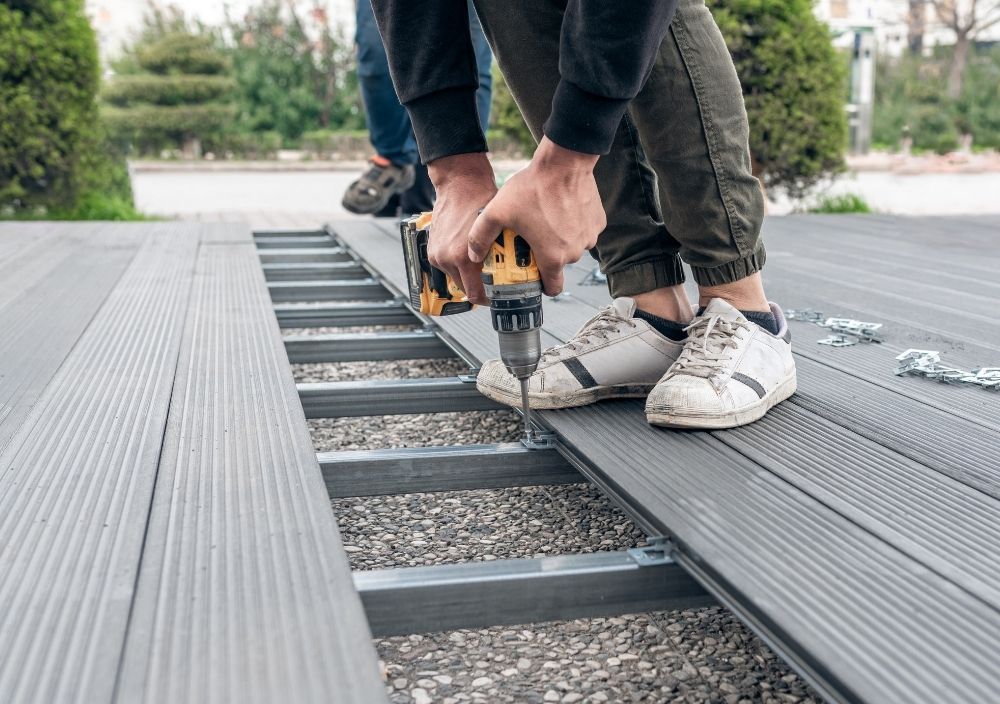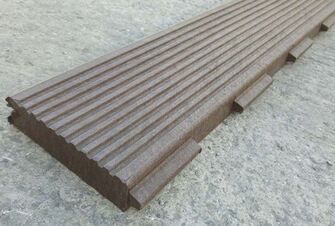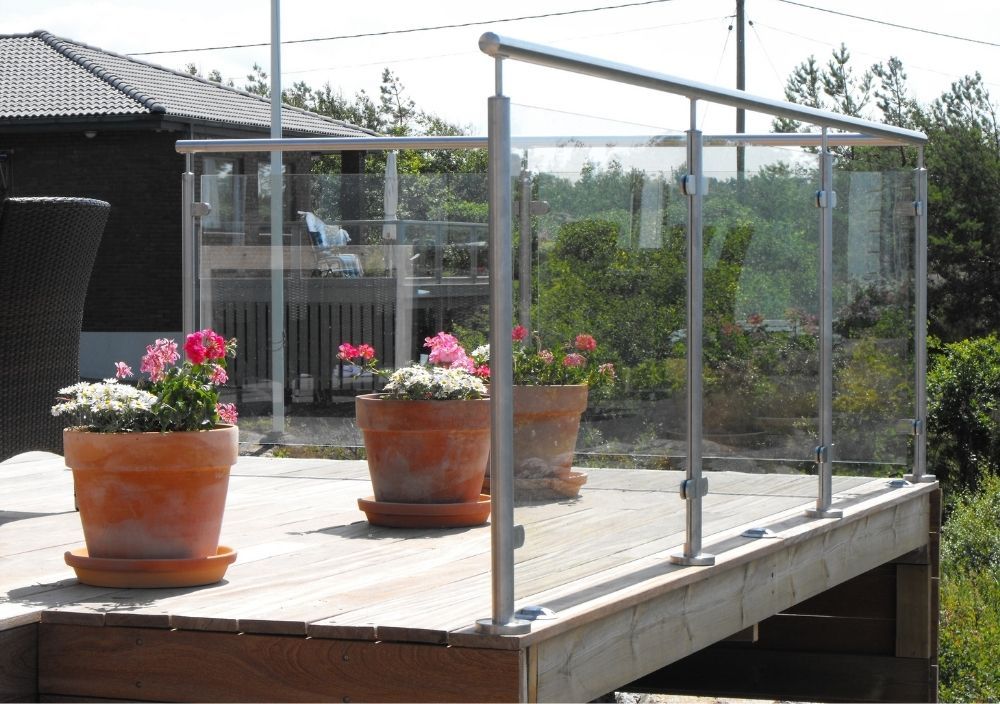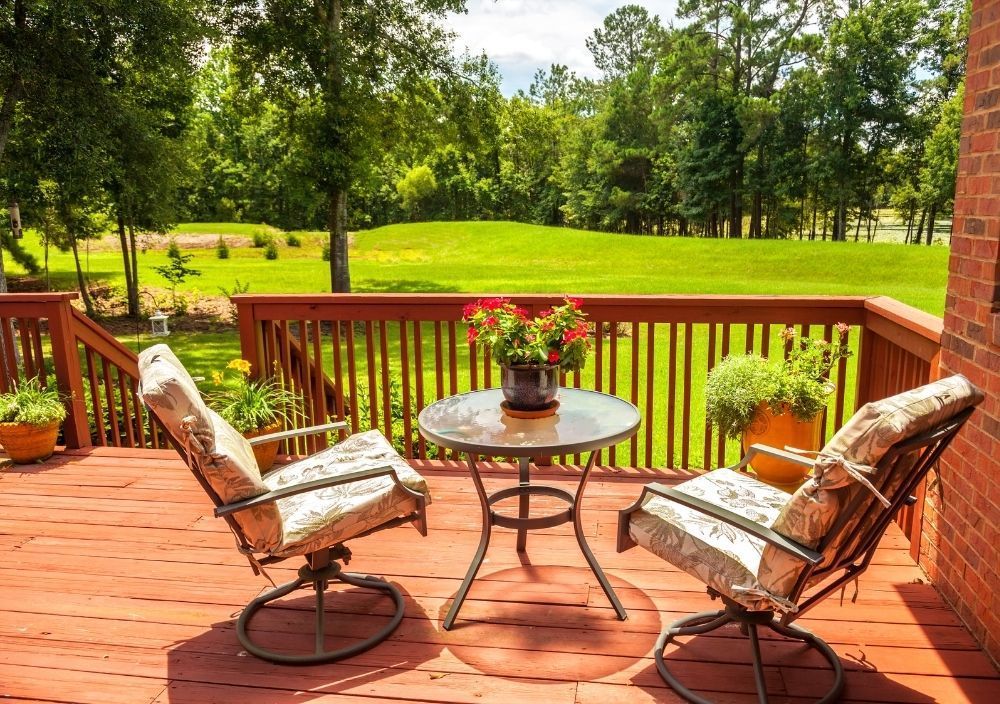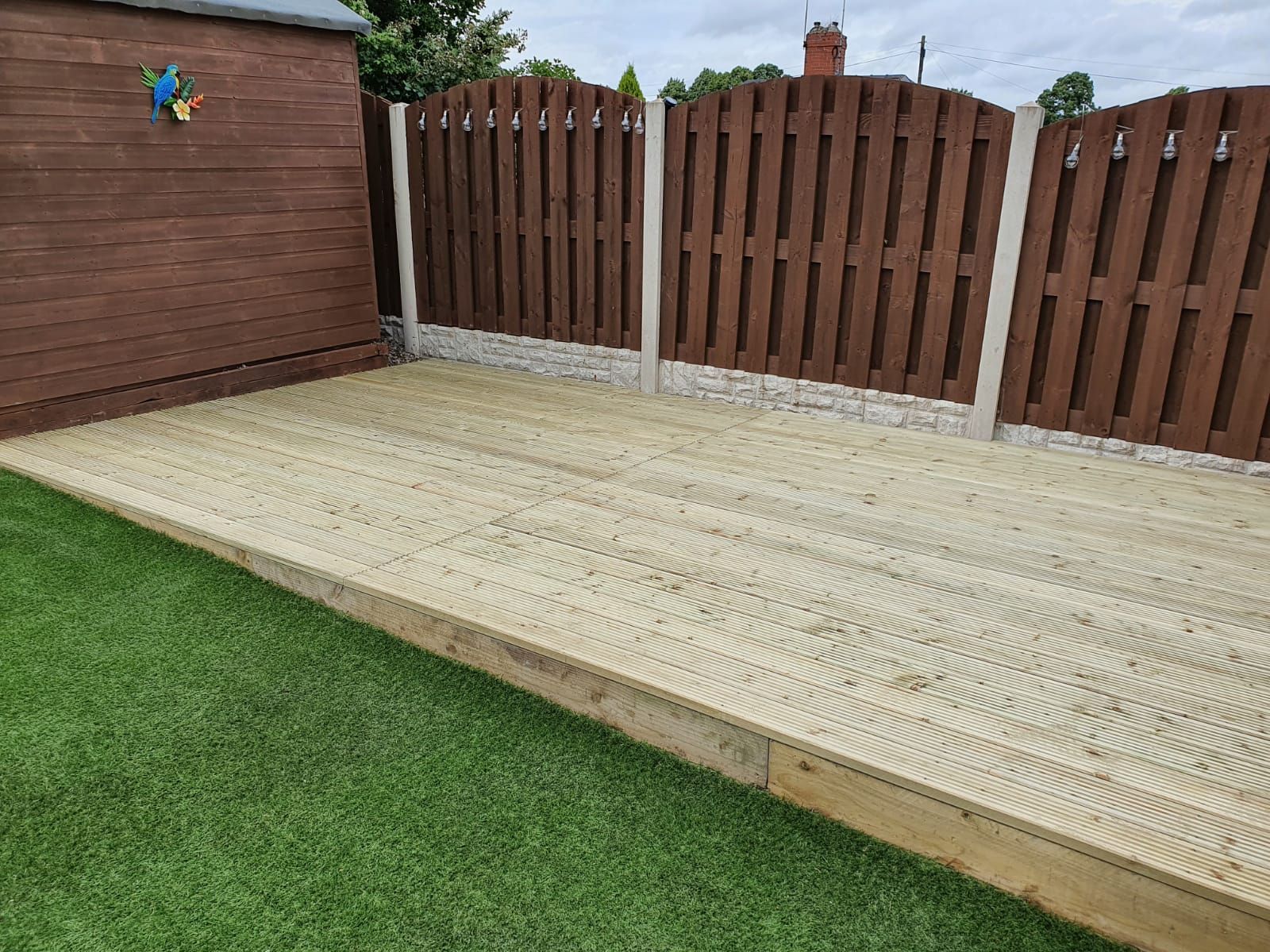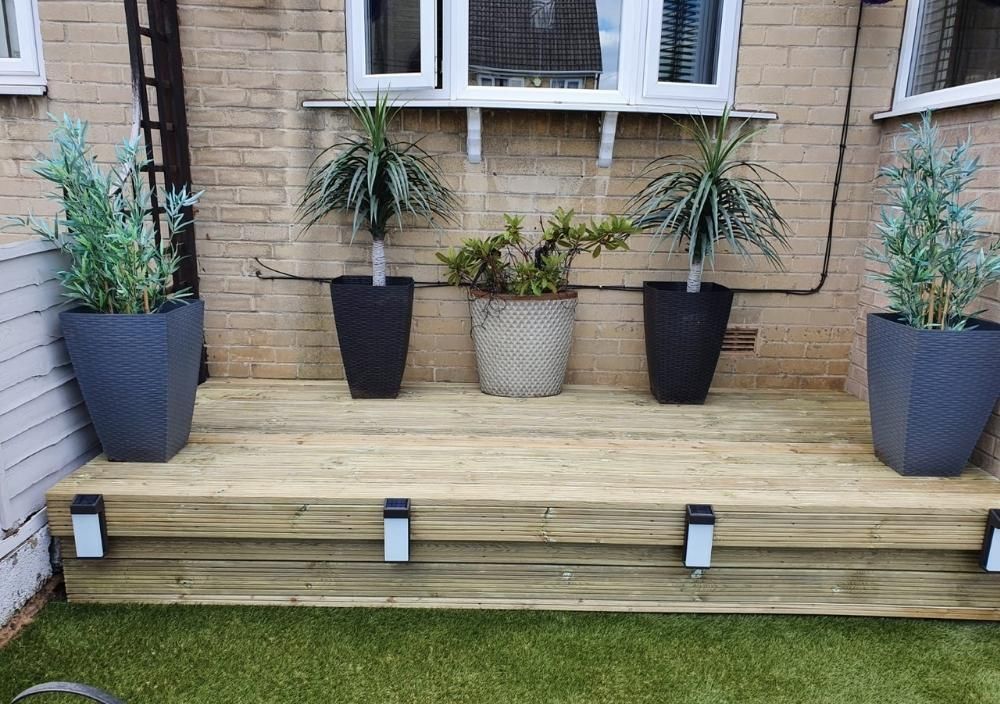Decking Doncaster
Looking to install decking in Doncaster?
Get in touch with Zest Decking Doncaster today for a FREE quote
INCLUDE YOUR DECKING MEASUREMENTS FOR A QUICK PROVISIONAL DECKING INSTALLATION QUOTE
SEND ANYTIME 24/7
Decking Doncaster Enquiry
Thank you for contacting us.
Our approved partners:
Clifton Fencing & Landscaping will get back to you as soon as possible.
Please try again later.
Decking Installers Doncaster
About Us
Our team of local decking specialists who love building new composite decking, plastic or timber decking structures. We cover most of Doncaster, so if you are thinking of getting decking installed or looking to replace your tired, weathered decking why not call our decking installers Doncaster team to arrange a no-obligation quote.
As well as installation our services include decking design where we look at your garden layout, what your looking to get out of your decking and how it's shape, position and layout can help you achieve exactly what you want from your garden decking. Our expert decking contractors will be happy to discuss your decking ideas an offer additional suggestions or advice if required.
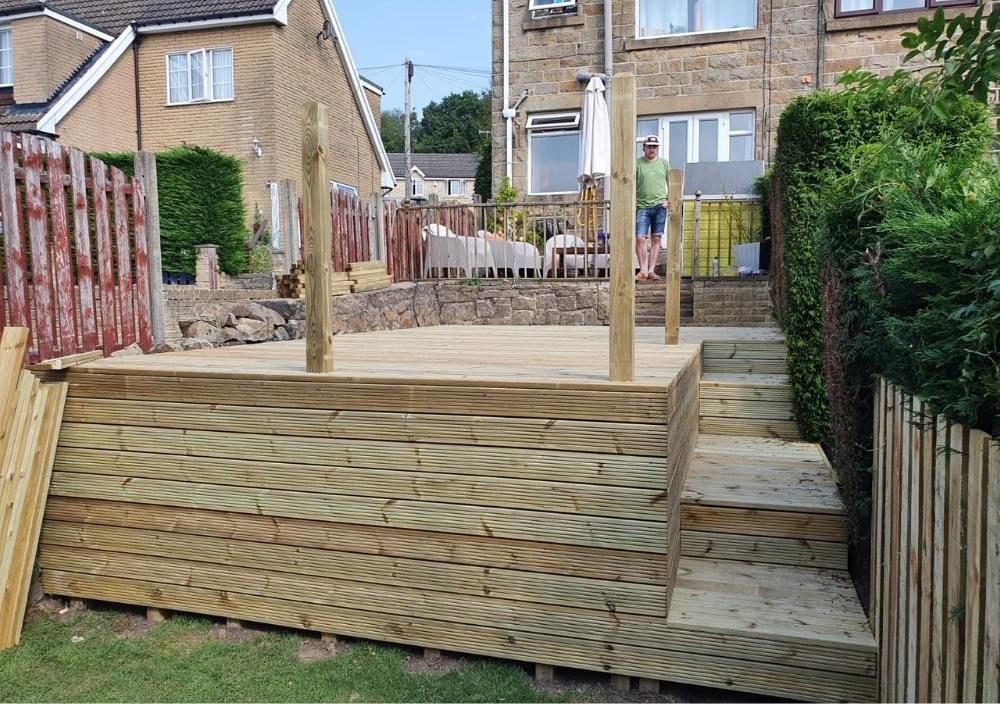
Slide title
Write your caption hereButton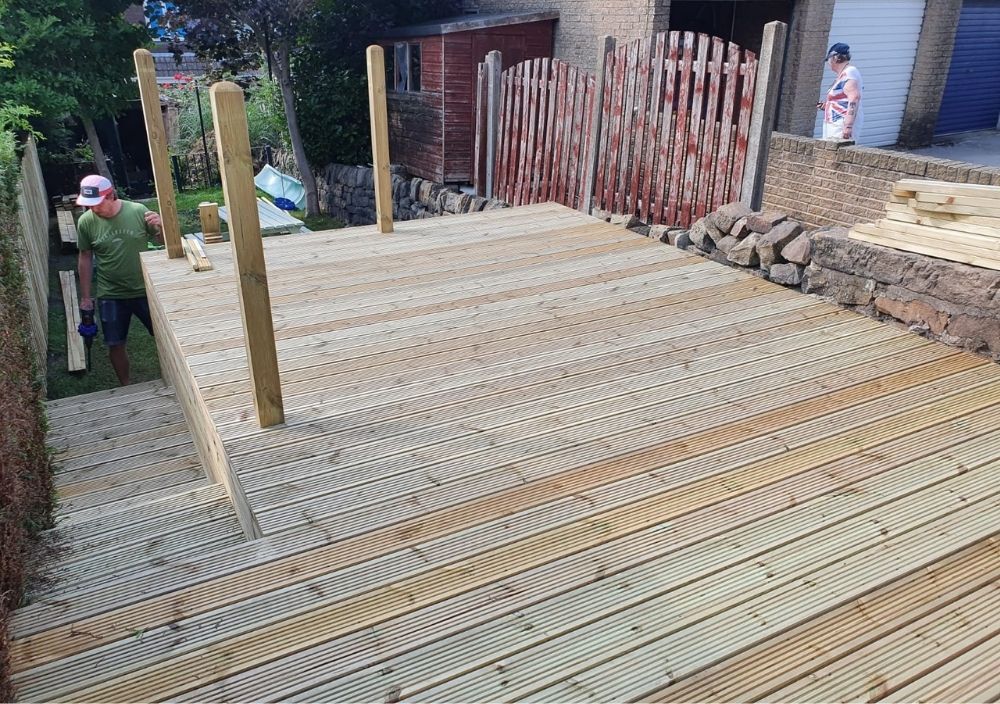
Slide title
Write your caption hereButton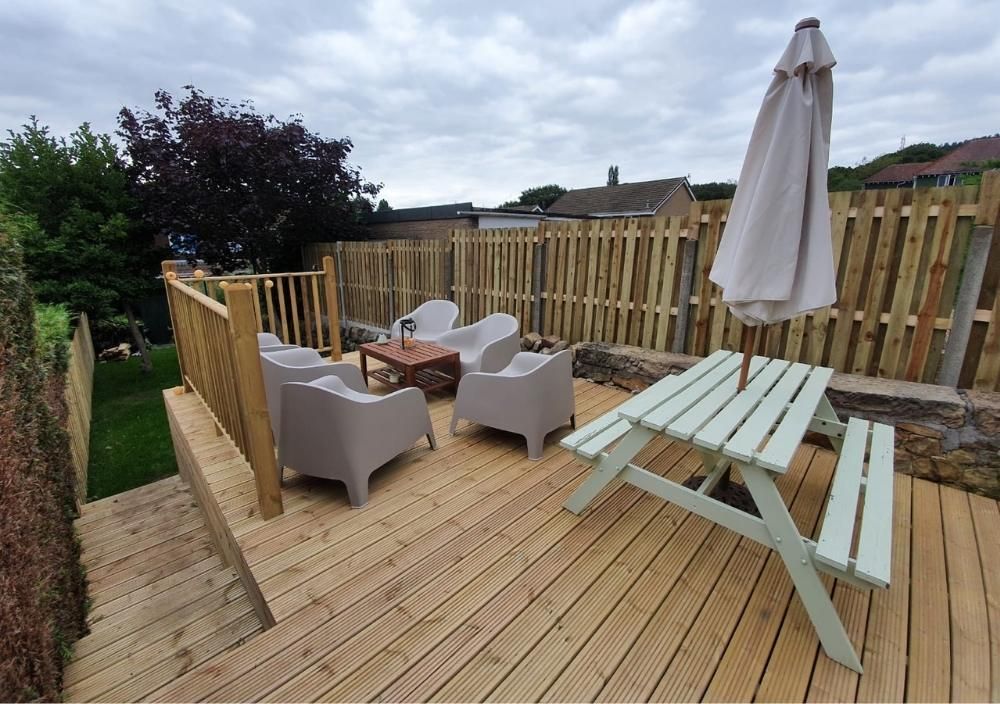
Decking Installers
Write your caption hereButton
Doncaster Decking
Composite Decking
We install composite decking one of the fastest growing materials
Timber Decking
Softwood timber decking is still the most popular material in the UK
Plastic Decking
Plastic decking also continues to grow in pupularity
Decking Design
We can advise on decking design, orientation and position aspects
Balustrades & Lighting
Balustrade provide an important safety aspect whilst well fitted lighting provides the wow factor
Benefits of Decking
Decking can provide an all year round practical space for your garden
Composite Decking Doncaster
So what is composite decking, why should you chose it and is there any difference in composite decking installation compared to timber? And why is it becoming so popular across the UK? At Zest Decking Doncaster we take the time to discuss the pros and cons with you and whilst composite may be the best decking choice for some people it may not be best for you. We'll understand what you're after - and if composite decking ticks the boxes for budget and aesthetics, we know it will tick the boxes for durability and low maintenance, which is why it is rapidly catching up timber decking as the first choice for decking in this country.
Decking Installers near me
Contact us any time of the day or night through our contact form if looking for decking installers near me in Doncaster
Composite decking in Doncaster
Composite decking is mostly made up of plastic polymers but this material is also combined with very fine wood fibres, almost powder like in size and a bonding agent, which combines the two materials. Most wood fibres used in composite decking come from recycled sources, as are a number of the polymers used making them a good environmental choice.
Composite decking installers Doncaster
Since composite decking is a man made material which goes through a production process it means that some aspects of production can be altered or varied. This can be in terms of designs shown on the outer surface, it can also be in terms of the thickness and construction of the actual composite deck panels as some are solid whilst many others are hollow to some degree. The other variable is the ability to add difference dyes to the mix which means that much wider colour options are available from composite decking as apposed to timber decking although most composite decking focuses on shades of greys and browns since most people want there to be some resemblance to timber and these neutral colours blend quite naturally into a garden environment. That said there are those people who want their decking to be a showcase feature in the garden and blacks, whites, greens and redder browns can also be found.
Composite decking maintenance
The primary reason composite decking is chosen is that it requires little to no maintenance. Whilst you may not need to perform the same treatments as you would for timber it's not to say that composite decking keeps itself clean. Like any outdoor or indeed indoor items which are regularly used the build of dirt and debris is inevitable, which is especially the case with any outdoor structure.
In the same way that you will choose to clean you car, cleaning your composite decking will simply mean that your decking will continue to look as though it has recently been installed. Even though, decking should be installed to provide a subtle run off for water, there may still be areas where a small build up of water may occur which itself will attract addition dirt and grime. Simply brushing off will minimise any build up of dirt if left for the water to simply dry out.
If you perhaps have left attending to your decking over the winter months and dirt, bird droppings and leaves have accumulated on your composite decking maintenance will simply be a gentle pressure wash, or brushing with some mild detergent water which will quickly bring up your composite decking to its former self.
Composite Decking Installers near me
Contact us any time of the day or night through our contact form if looking for composite decking installers near me in Doncaster
Cost of Composite Decking versus Timber Decking
The biggest difference between the cost of composite decking versus timber decking is the initial upfront installation cost with composite being more expensive than timber. However, this cost differential is continuing to close as timber prices continue to rise at quite alarming rates and more entrants are joining the composite deck ranks where this healthy competition is keeping prices more stable.
However, when discussing 'lifetime costs' then the cost picture does change over time. The amount and rate however will vary as to how much cost you place on your own time, assuming you would carry out your own timber maintenance work. There are no real 'material' costs associated with cleaning composite decking and since no treatment is required there are no costs here. For timber application of 'deck oils or other protection treatments have a pound costs so over the course of 10-20 years this adds up. The other more variable costs is the time spent apply these treatments year after year. If you decide to pay a garden service company to do this for you then you will know the exact cost but it you decide to do this yourselves what price do you put on your time - £10 or £20 per hour? What else would you have preferred to be doing with this time? Clearly the reason you have decking installed is to enjoy your outdoor area rather than creating more maintenance jobs for the garden. It is this 'opportunity cost' which is the greatest factor for most people who chose to go down the composite route and stretch there budget a little more to have composite decking installed.
Timber Decking verses Composite Decking
We've already covered some of the cost comparisons so what other areas are there to compare between the two most popular types of decking?
One if longevity, which also factors into costs. When selecting timber decking the lowest cost option is pressure treated timber decking. However, this will need treating on a regular basis if you are to get this type of decking to last to around 15 years. Even though composite decking doesn't need treating many manufacturers will give 20 year guarantees to there materials - some even going as far as 30 years. So if you are planning on staying in your current home for life, then you may have to replace your timber decking twice, whilst your composite decking is only changed once. This durability with minimal maintenance has great appeal for people in their forever homes.
Another comparison factor is the environmental side. Whilst plastic has had, and still has some poor publicity some people will simply want to use natural resources such as wood. fortunately most wood used in timber decking is responsibly and sustainably sourced so this can be seen as renewals. However, since much of the plastic used in composite decking and the timber is also from recycled resources this difference is less marked. Also factoring in the lifetime aspect - not having to replace your composite decking as frequently as timber clouds this 'carbon footprint' debate further.
At a very basic level some people simply like the natural look and feel of wood. Whilst composites are being designed to have a wood effect to close this gap, they will struggle to replicate the feel of natural wood underfoot.
We hope we've covered a number of points to consider when making your choice which will not doubt end up being based on budget and personal preference.
Timber Decking Doncaster
So you are wanting to sort out a timber deck to enjoy over the spring and summer months - and possibly into autumn? We art Zest Decking Doncaster can sort out your timber decking installation regardless of whether you are looking to install softwood, hardwood or even layered timber deck boards.
Perhaps you even weren't aware of some of the timber decking choices which are available, if that is the case we hope the following information will help you in your journey in deciding if wooden decking is for you, and if so which timber decking would be most suitable for you and your budget. All the Zest Decking teams are fully familiar will all the wooden decking options and are happy to have further discussions on your new, replacement or extension decking project.
Softwood Decking Fitters Doncaster
Softwood is still the most widely used decking material in the UK, this is mainly due to it providing the lowest initial install cost which means if you're on a tight budget but really want to have a deck area, this deck wood will provide the best option to get this garden project completed. From an installation perspective it is one of the easier materials to work with, which also helps keep labour costs down along with the material costs.
Softwood does not literally mean that the wood is soft - it's a general terms which refers to the woods which come from a number of evergreen or coniferous trees. These trees are generally some of the fastest growing which is why they are so common for wood projects and replacement trees planted to keep the cycle of wood availability and sustainability going. As well as the cutting and shaping of the wood, decking boards also undergo a treatment process known as pressure treatment. This is a similar treatment which some fence panels also go through where chemical preserves and insecticides are introduced to the wood in a pressurised environment. The pressure means that the preservatives go all the way through the wood and result in a much longer lasting product, more resilient to insect and moisture damage. The alternative to pressure treating is dip treatment which is more common on fence panels and as the name suggests the wood is simply dipped into a pool of preserve. This results in an outer coating of preserve rather than a thorough treatment all the way through. It's a cheaper process and as a result does not provide a long lasting end product. This treatment really shouldn't be used for deck boards so if ever you get an unusually cheap quote for timber decking be sure to question the source and treatment of the deck boards.
Softwood decking will show signs of wear if it is in high use, which will require more regular treatment to the boards with protector and oils to maintain a more waterproof coating and show off the colour of the wood.
Hardwood Decking Doncaster
Hardwoods are a reference to wood coming from slower growing trees. As a result the replacement and regeneration of hardwoods is a much slower process. The net effect of this means that hardwoods such as ash or oak will cost substantially more than softwoods. In the case of deck boards the woods most commonly used are ipe, iroko, teak, cumaro and balau most of which are not native and therefore need importing from countries in South America and Africa.
If your budget allows this will be the choice of the purest - a natural wood product, most of which will have a distinctive natural colour - some golden and others a deep red/brown. Hardwoods have a natural resistance to fungi, rot and insect infestation however, the level will vary slightly from hardwood to hardwood and whilst there will be significantly less maintenance require than softwood decking some level on preservation work will be required, especially if you want to maintain a particular colour level as over time most hardwood decking will change colour over time again the nature of which will depend on the individual wood, but most will tend to darken.
Layered timber deck boards
These type of boards are not commonly promoted and therefore known about but for some people this additional safety feature can be an important addition or option for their decking.
The build up of algae on wooden decking can provide a very slippery surface when wet, especially if you have decided that you want to have the smooth side of your decking as the one you walk on. For some families this risk is a little to great, especially with older relatives so timber deck boards provide a non slip option.
Retrospective slip resistant strips can be applied to decking but better option if to have a board which has been layered in the factory. Typically a board will either be layered will a very thin layer of artificial grass or hard wearing rubber which will provide the slip prevention surface addition. Whilst this may not be the most aesthetic of choices for many people it is a preference to a trip to hospital with a friend or relative.
Timber Decking Maintenance
So what's involved in timber decking maintenance and how often does it need doing? Whether you've decided on softwood or hardwood decking you will need to look after your wood, however hardwood owners will have a much less frequent chore than those with softwood decks.
One aspect to be mindful or with regards to the level and frequency of maintenance treatment on decks will be depend on the level or usage and also the location of your deck. Clearly decking which is used very frequently by larger groups of family and friends will be subject to more wear. As a result you may need to apply decking oil every 6 months or less if in direct sunlight rather than every 12 months, which is a more standard approach. The oil will provide colour fade protection and waterproofing to softwoods. If you are a hardwood decking owner your treatment regime may vary on the particular wood you've chosen and you should also check the suitability of decking oils or stains before applying them.
So should you treat your timber decking with and oil or stain? Oils generally soak deeper into the wood to provide good protection against warping and cracking. Oils will tend to try and bring out the natural colour of the wood rather than creating an additional top coat and consequently they are a better option for patch repairs. Stains as the name suggests provide more of a colour top coating which provides a protective hard wearing seal for the wood, but as a result can be more slippery than an oil treatment when wet. Both provide protection against mould and algae. Stains will need stripping if you wish to apply a different shade, or if the seal shows signs of cracking, which can be very tricky with a grooved board.
Doncaster Decking Design
There are a number of aspects to take into consideration when deciding on a particular decking design. Sometime simply searching online for inspiration can help but also its worth bearing in mind that some of the factors which influence certain decking areas in one garden may not apply to you, your garden or even your budget.
A start point for many home owners will be that they see a decking area as an an outdoor extension of their kitchen. Indeed this also provides a very practical solution in terms of it being close to the fridge, food and toilets inside the house. However, you should also consider some other factors too, so that your avoid 'decking remorse' when you subsequently wish you did things differently once your decking project has been completed. Other important factors to consider will be the amount of sun your deck area will capture. Depending on the orientation of your garden your house may cast a shadow over the area immediately next to your kitchen so deciding to position your decking right next to your kitchen may result in a decking area constantly in the shadows.
Also depending on whether or not your garden has a slope, the level and direction of your slope may also mean your decking area can become a beautiful vantage point for the whole of your garden, or a focal point for curious neighbours. A decking area, especially a raised one will significantly change the look of your garden and since it will be a reasonable investment you need to make sure your fully considered all options and scenarios.
Decking Board Design
This is probably an area which doesn't get get discussed or thought of often. Whilst most decking is laid out horizontally from the back point of the deck area this doesn't have to be the case. The way the boards are laid out within your decking area diagonal means you can be a little more creative in your approach different laying options include laying them horizontally against each other or having a point from which to lay them in a chevron fashion. Another option is to use individual square deck boards, which themselves may be horizontally laid or in a patterns to form a complete square. These are additional aspects to consider however the main reason these decking board designs have limited popularity is that they will drive up costs. By laying in a non uniform manner you will inevitably be creating more cuts of the boards, so more boards will be required and there will be more boards waste. Deck squares are rarely used for a raised deck area, as these smaller sections will required many more supporting joists - they are best used on a flat section of ground which requires minimal structure to be created underneath the board squares.
Composite Decking Fitters near me
Contact us any time of the day or night through our contact form if looking for composite decking fitters near me in Doncaster
Decking in Doncaster
This may seem a rhetorical question but seriously have you paused and though what your decking in Doncaster will be used for and also who is likely to use it?
You probably thought we want decking where we can put our table and chairs out and use that as a place to chat and have drinks. Well if that's that case you'll certainly be in good company but will you be looking to cook out on your decking? Have you accounted enough space for a barbeque to be set up. Will you want to set up a sun shade/umbrella area and will this be free standing or come out from the side of your house?
To you have a large family where you children may want to play games or use the table an chairs to draw or play board games - if so have you let yourself enough space to set up a sun lounger to relax a little bit further way? If you plan on entertaining a larger number of people - how many chairs can you comfortable get on your decking area? Will older people also be expected to come onto the decking, or young children - if so what sort or balustrade or railing would be most suitable from a safety perspective?
Whilst we at Zest Decking Doncaster can't answer these questions for you please spend a little time considering a few more scenarios before work commences so your decking specification is future and scenario proof!
Raised Decking Doncaster
If you have a sloping garden decking provides a fantastic way of having a flat focal dining or entertaining area. However, depending on the steepness of your slope you may want to consider more than one level to provide some segmentation to your decking area which can really provide a creative entertaining and display are within your garden.
If you are on a large slope and you want your decking towards the top of the slope - which will generally be nearer to the house, you can have one flat area with one set of stairs as an access point but you can also have a couple or even several flat layers which can be accesses for both sides which can be very useful of you pan on entertaining larger groups which may have children going between the garden and decking area on a frequent basis.
A raised deck with multiple layers also provide a great place for pot plants to be included on the decking area which can also include ones, which can drape over the edge of the decking and downwards. choosing the right plants for this can create quite a stunning floral showcase to your garden.
One final aspect to consider with a raised deck is how exposed you want the underside to be and what you would or wouldn't want this space to be used for. Decking will have expansion and air gaps, so whilst obscured someone can look up through the floorboards of a deck - just bare that in mind. Similarly if you have deck lighting would you want young children able to access the underside of the deck easily? Access to the underside is useful from a maintenance check perspective but perhaps some sort of restricted access may be more suitable in certain circumstances. If you have had a large raised decking the space underneath can provide a useful as a storage area too - so plenty of aspects to consider!
Garden Decking Doncaster
We've already touched upon raised decking and some ideas related to that such as multiple layers and the use of pot plants which work well in any decking configuration. Other considerations will be the inclusion of railings or balustrades and whether these should be the same material as the decking, or whether metal and glass would also work well with your decking configuration. If you have layers you can also use balustrades to section off certain areas such as the barbeque are as an example. Whilst railings aren't really a safety feature in this example it can provide extra depth and interest to you area and they also provide a handy feature from which items can be hung from such as small pot plants, or even cooking utensils whilst the outdoor chef is in action.
Similarly the inclusion of deck light should also be considered as it clearly makes sense to have these installed when your decking is first installed rather than a retrospective addition
What size should your decked area be?
This really depends on how you intend to use your decking, as discussed earlier however, creating a decking area is relatively straight forward for professional decking installers so there is no written rule which says you can't have more than one decking area in your garden.
Since decking provides a feature aspect to a garden they are a great way to add extra depth and design - especially within a large garden. Another decking area with a bench and possibly a pergola at the other end of the garden can provide another relaxation spot away from the entertainment decking.
Positioning your garden decking?
We've already covered some aspects but clearly the position of the sun in your garden and how and when this sweeps over your decking area should be a consideration. You should also think about its position relative to other plants and in particular trees, which may cast shadows over your decking or worse hang over your decking providing a location for bids to perch and leave their droppings on your decking. So combining some garden or tree surgeon work may also help bring out the best for your decking.
UPVC Decking Installers Doncaster
Whilst most people are familiar with composite decking, plastic or
UPVC decking is also growing in popularity the main reasons being, just like composite decking, it provides a low maintenance decking option. Just like timber or composite our Zest Decking teams are just as happy to install UPVC plastic decking if that ends up being the choice you opt for. Since UPVC decking is available in a wider variety of colours, certainly than timber, this may be where you can achieve the look you're after for your decking area.
Plastic Decking Doncaster
Historically plastic decking was fairly exclusively associated with the deck areas which surround static caravans, however, as technology and material developments have advances UPVC decking now has a place in gardens across the UK.
What is Plastic UPVC Decking?
So what is plastic or UPVC decking and how does this differ form composite decking. Fairly simply the main difference between a plastic and a composite deck board is that a plastic deck board will be made up entirely from plastic where as a composite board will comprise of mainly plastic but will also contain a percentage of wood fibres. So - does this may much of a difference?
We certainly not according to UPVC decking manufacturers. Most plastic decking manufacturers use recycled plastic for their boards so the argument of sustainability, recyclability again becomes quite a subjective area with one type of board whether it be timber, composite or plastic having a case for having a lower total carbon footprint over its lifetime compared to the others.
UPVC Decking versus Composite Decking
When looking at the differences UPVC decking and composite this is more of a comparison exercise. in summing up some of the similarities both a predominantly made up from synthetic materials and it is the synthetic or plastic parts which provide similarities in features and benefits for both. One being the fact that both are pest, moisture and as a result much more rot resistance. Both require minimal maintenance compared to timber decking and are durable finishes. Both can have anti-slip properties which contrary to instinct, means that both are less likely to be as slippery as timber when wet.
Whilst UPVC decking will claim to be slightly stronger than composite, both will be strong enough for their intended purposes so why this is a feature if provides limited 'real benefit' over composite. It is also slightly lighter so whilst this is preferential from an installer's perspective it makes little difference to you as the deck owner once laid.
By being made completely of plastic UPVC decking it is therefore easier to recycle when this point is reached and is slightly more mould resistant than composite decking.
One claim composite manufacturers will make of plastic decking is that it will have a greater tendency to warp. The may well have been the case several years ago but with advancements in materials, fixing and laying with the correct expansion gaps this should not happen with modern UPVC decks.
As you an see there is very little to choose between them so the final decision may well simply come down to personal preference on a design or colour between the two.
Cost of UPVC versus Composite Decking versus Timber Decking
In todays current climate of uncertainty both in terms of imports/experts and raw material availability we are in fluctuating times regarding comparative pricing between the different decking board options. Wood prices are raising dramatically due to supply and production shortages, which is pushing timber prices nearer to composites and plastic decking so what used to be a substantially big installation price difference is getting less and less different. So unless you have already made a decision on which type of decking you want, it may well be worth asking for quotes for composite and plastic if you have some flexibility in your timber decking budget, especially if you are planning on staying in your property for a number of years
UPVC Decking maintenance
To be perfectly honest there is little to say about this - what is saying a lot! Whilst manufacturers will provide guarantees of around 20 years many will be expected to last nearer 30. It is worth remembering that it is plastic and not totally indestructible o resistant to all drops and spills. A gentle clean with a pressure washer will help remove and settles debris and if anything spills on it you should aim to clear it up as soon as possible - which should really be the case with all decking.
It is also worth carrying out an annual inspection get to ensure that fastenings are still tightly in place and haven't worked themselves loose it all. If they have simply tightening them will minimise greater movement and potential damage.
Decking Company Doncaster
So what are the main decking accessories? Well if you exclude items which you can simply place around or on decking such as plant pots, furniture sets and gazebos the main two items are balustrades or railing and decking lights both of which are installed as integral parts of the decking area.
Installing Decking Accessories
Whilst both balustrades and deck lights provide practical benefits both also provide aesthetic enhancements to your decking project and provide an extra visual factor to complete your decking.
As mentioned earlier, balustrades can help provide extra partitioning within a decking area as well as providing an outer boundary and lighting can simply allow you to showcase your decking area from inside your home even when not in use. however, we'll provide a little more information practical information on both for you.
Why install a Balustrade on your decking?
Aside from the cosmetic enhancement most people will decide to install balustrades or railings to their decking to provide a safety barrier to their decking area. This isn't just the case for raised decking, sometimes a fairly flat decking area will be located alongside a pond or rockery section and it can be very easy to be chatting, sipping on a prosecco near the edge of your decking area and simply put a foot over the edge and lose your balance on fall off the deck. Quite often balustrades simply provide a visual aid or reminder that the edge is near rather than providing a strong barrier. clearly though for raised decking a balustrade provides a very important safety feature and these will need to be securely fixed into the joists to provide added strength and support. For some people a more solid balustrade will be required rather than vertical rails to minimise items falling or rolling through rails and off the deck balcony. Commonly if you have a number of steps taking you up to your decking area a rail to hold onto on the way up also provides an added safety feature
So is installing a balustrade really necessary when you have a fairly flat deck? Well not really from a safety perspective but almost all the decks our teams have installed the ones where the owners have felt that a special area has been created are those, which also include balustrades. They really do finish off a decking area and give it a real sense of having a special place and function.
Types of Balustrades - Glass Balustrades
Most people with choose a balustrade which is matching material to their decking and this would seem to be a fairly obvious choice to make however, some decking manufacturers do have a limited number of options as to the type of matching balustrade available.
If you're not enamoured with the manufacturers choice then going down a completely different style of balustrade can work really well. Wood can work with plastics and composites and vice versa although this can be very dependent on styles and colours. Glass balustrades are generic enough to work on almost any type of decking and strand wire also has this ability. Aluminium and wrought iron are other options. Each has it's merits and downsides the main one for glass being another surface to keep clean as when it's dirty it certainly shows of the smudge marks. Prices will vary across the different types of balustrades so when planning your deck area don't forget to factor these in as part of your total budget. Granted they can be installed at a later date but it will be cheaper overall to get them installed at the time of your decking installation.
Decking Lighting
surprisingly decking lights are often initially forgotten about especially when deciding on the placement and size of your decking area take the primary focus and in some cases the location of your decking may minimise the need for additional lighting as your outdoor house lights and spot lights may be able to light up your new decking area.
However, if this is you initial though process on lighting it may well be worth setting up a a few chairs in the area planned for your decking and see how your existing lighting works from a number of positions. If all your light is coming from one direction it may be blinding for some people facing towards the light and offer limited visibility for them and those people with their backs to the light as the shadow cast will blacken out most things.
If your decking is a little further away from your house deck lighting literally will light the way back to your decking area and ensure that when people step back up they don't miss their step. These days deck lights are available in a variety of colours and these can be mixed effectively to provide both directional light and diffused light which will cover all bases. Integrating lighting into your decking either at the sides, from the bottom up or from the balustrades will provide the touches to your decking area enabling you to make fuller use of it across the year and through summer nights.
Your local Zest Decking team will happily discuss your needs and offer suggestions on how to get the most from your deck lights.
What Decking offers
Deciding to add decking isn't just about changing the surface of a section of your garden it is an investment into your home, garden and lifestyle. Whilst there are many other garden enhancements you can choose from, decking is quite a distinctive hardscaping addition to your outdoor area and one which has a discernible visual impact. As such it continues to grow both in terms of new decking areas and replacements and extensions to existing decking areas.
Decking provide an outdoor room feel a distinctive area which can even be set up and sub divided in to entertaining areas, play areas, exercise or relaxation areas. As it's surface is not as hard or harsh as paving it is its versatility which provides the most appeal easy to walk barefoot sit or lie directly on. Even business are setting up decking areas for staff to enjoy outdoor space at break and lunchtimes to get out and enjoy the fresh air - its the perfect framework to enjoy outdoor space.
Why choose decking?
The visual appeal of decking is why most people opt for a section of decking in their garden. It also makes a social statement saying your are outdoor lovers and like to entertain outdoors. Especially since more composite and UPVC deck boards provide wider choices in terms of styles and colours it is easier now than before to find a style of decking which will appeal to your tastes.
If this is for you then please get in contact with your local Zest Decking Doncaster team they can advice on all aspects of getting your decking area suitable for your needs and requirements. a decking area is also something which many home valuation experts will say also adds to the saleability of your property with some debate on whether it also adds value too. From a purely social aspect its a fantastic outdoor space for families to get together and it's hard to put a pound value on that!
Decking versus paving and patios
For landscapers who provide both decking and patios as an option they will probably sit on the fence, pardon the pun! To some extend there will be a closer run decision on whether to choose a patio or paving area versus a decking area on flat ground. It's also worth bearing in mind that depending on where you are thinking of placing your decking or patio area is that they could also be used to complement each other. This can especially be the case where you are looking to add different levels to a garden or create stepping from an existing slope. Paving and even a section of patio can lead into the next layer of decking. If you are purely looking to create a flat entertaining area on a steep slope then decking will be the most cost effective solution as setting the decking on stilts and joists means that minimal earth removal will be required saving the time, effort and disposal costs associate with removing large amounts of earth.
Looking for garden decking installers Doncaster?
Call Zest Decking Doncaster today
Many Decking options – flexibility of decking
Decking allows you to be much more creative with your space and within the decking area itself. We've already covered many of the options you have with decking from multi layering, having different access points and stepping, laying of the deck boards, the type, style and even colour of deck boards. Even after you've decided on that then your can use balustrades to provide both a safe and visual sectioning around or within your decking area. Finally you can also incorporate decking lights to enable you to enjoy your outdoor space for longer hours during the day but even more days throughout the year. It really is a fantastically versatile garden addition - so please get in touch to move forward with your ideal decking today.
Need help?
FREQUENTLY ASKED QUESTIONS ABOUT DECKING IN DONCASTER
-
How long should timber decking last?
Clearly, a major factor in how long timber decking will last will depend on the level and frequency of wood treatment. Using good quality decking protective treatment applied at the very least every three years should mean that your softwood decking lasts about 15 years. If you’ve inherited decking by moving house the telltale signs mentioned earlier such as cracking and shrinkage may mean that your decking has gone beyond retrospective treatment and you’ll need to look at full deck replacement. If your structural timber is in good condition it may mean a simpler and less costly task of simply replacing the deck boards. Even with a timber structure, composite decking can be still be fitted onto this base to provide a low maintenance alternative to timber deck boards. Otherwise, prepare yourself for deck treatment work every couple of years to make your new softwood timber decking last at least 15 years!
-
When does decking need replacing?
There will be a number of indicators that your decking is past its prime. Clearly, the final decision will rest with you in terms of how long you leave it and of course whether your finances will allow for a new decking this year rather than next.
That said, we’ll try and provide you with some points to review and hope that when the time comes you will give us at Zest Decking a call.
If you have boards where gaps are growing between them, or there is deck board movement, this can be an indicator that there may be an issue with the supporting structural timber below as well as the deck boards on top. A good way to check is to remove at least one of the boards to decide if the issue is with the decking boards, the structural timbers or both. If you have balustrades and handrails which also have a lot of play in them it’s a good indication that your decking structure has pretty much had its day.
If the structure has been checked and given the thumbs up but deck boards have extensive cracks, splinters, colour variations or other damage you can simply replace the boards.
Ideally, if you are having new or replacement timber deck boards it is prudent to have these fitted with a slight slope to allow rainwater to run off and not stagnate or puddle in the deck grooves. Therefore the decking should be laid so that the slope runs along the length of the grooves to allow water to run off the wooden decking helping it to last longer.
If you have movement of the total structure or it looks like it is leaning, then there is an issue with the structure, most likely around the structural deck posts. Clearly, this poses a potentially serious hazard and replacing your decking completely, should be recommended.
-
Which decking boards are best?
Well, that depends on what you’re looking for. Best for the price will be softwood decking as this will be the cheapest decking board option but the downside is that they will require by far the most maintenance so long term may not be the cheapest if you were to add up the time, effort and treatment materials for over 15 or so years. However, if your initial budget is limited this is a great way to finally getting yourself a decking area for your garden. The better wood-alternative is hardwood decking but this can end up being one of the most expensive decking materials. It is expensive as hardwoods such as walnut and balau are much slower growing than softwoods so are not as widely available. They will generally have a natural darker appearance and will look like an expensive interior floor and will require quite little maintenance. If looked after well, they can last almost as long as composite boards, so will have a lower cost if the total cost of your decking is divided over the number of years it lasts.
Finally, composite and plastic boards are the lowest maintenance options by far. For the general look and feel composite will provide a more authentic wood effect due to the natural wood fibres also since the production process is slightly simpler the cost of plastic should be slightly less than composite. Plastic decking will typically ‘look more plastic’ than composite decking and there have been instances where if plastic decking has not been laid with appropriate expansion gaps warping may occur. For the smaller additional cost of composite decking to have a great looking virtually maintenance-free decking which should last at least 30 years composite will generally be the best long term decking both in terms of overall lifetime costs and aesthetics.
-
Where’s the best place for deck lights?
Adding lights to your decking can make your decking a real showpiece as darkness starts to decent on your garden in later summer. However, too few and they provide little practical use and you would still need to provide additional lighting for your decking. Too many and the aura will be overbearing and unpleasant for most people.
Since deck lights can be placed in a number of locations getting the correct balance between them will make a big difference to the overall look of your decking at night.
Incorporating decking in the centre of a deck board, avoiding joints and between 1.2m and 1.8m apart is a good rule of thumb. Where you have stairs leading to your deck, aim for the lights per step being a similar distance apart. Where you have wall lights at the side of your decking, since these serve a more decorative purpose, extending the space 2-3m apart should work fine whilst lights on balustrades should be 1.8m-2.5m apart.
-
Will Zest Decking Doncaster take away my old decking?
Yes - if we are carrying out a deck replacement then we will remove and take away your old decking and recycle accordingly.
We provide a complete turnkey service, so once you have commissioned us to do the work simply wait until we are finished. Give everything a fill inspection and the get your deck furniture out and enjoy the great outdoors!
Garden Decking in Doncaster
AREAS COVERED BY ZEST DECKING INSTALLERS:
Decking Lincoln , Decking Leeds , Decking Doncaster , Decking Nottingham , Decking Mansfield , Decking Ilkeston , Decking Long Eaton , Decking Rotherham , Decking Colchester , Decking York , Decking Coventry , Decking Kenilworth , Decking Leamington Spa , Decking Warwick , Decking Rugby , Decking Conisbrough , Decking Wath upon Dearne ,
Decking Balsall Common , Decking Bedworth , Decking Bulkington , Decking Burbage , Decking Cawston ,
If you are looking for further low maintenance composite options for your garden why not get in touch with Composite Gates UK, for a great set of composite garden gates in Doncaster.

